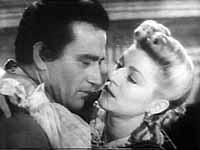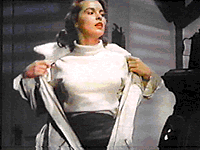 John Wayne and Claire Trevor in Dark Command.
|
 Wayne plays a romantic, easy-going, sincere frontiersman who becomes marshal of a small town to win the affection of the woman he loves (Claire Trevor). Wayne's opponent Cantrell
(Walter Pidgeon), an intellectual egotist, feels he ought to have been marshal
because he can read law books. Disgruntled, Cantrell raids Kansas and sets it
bleeding during the Civil War. The film has several wild shifts in mood, but
the highlight is Archie Stout's haunting cinematography. When Trevor visits
husband Cantrell at his mansion compound, the camera is strapped to a buckboard
and as it tracks in, her point-of-view reveals a dissolute lot of "soldiers,"
cavorting, drinking. None of Cantrell's men seem to be able to button their
shirts! And once inside the opulence of the mansion, Stout's dim lighting
diffuses Cantrell's gifts (jewels for his wife) and hospitality (a turkey
dinner under candlelight for captive Wayne) into something sordid. We all want
Trevor to get out of his corrupt clutches and with the help of Wayne she does. Wayne plays a romantic, easy-going, sincere frontiersman who becomes marshal of a small town to win the affection of the woman he loves (Claire Trevor). Wayne's opponent Cantrell
(Walter Pidgeon), an intellectual egotist, feels he ought to have been marshal
because he can read law books. Disgruntled, Cantrell raids Kansas and sets it
bleeding during the Civil War. The film has several wild shifts in mood, but
the highlight is Archie Stout's haunting cinematography. When Trevor visits
husband Cantrell at his mansion compound, the camera is strapped to a buckboard
and as it tracks in, her point-of-view reveals a dissolute lot of "soldiers,"
cavorting, drinking. None of Cantrell's men seem to be able to button their
shirts! And once inside the opulence of the mansion, Stout's dim lighting
diffuses Cantrell's gifts (jewels for his wife) and hospitality (a turkey
dinner under candlelight for captive Wayne) into something sordid. We all want
Trevor to get out of his corrupt clutches and with the help of Wayne she does.
Wheel of Fortune (1941) Republic Home Video.
This film is an absolute gem. Wayne plays Lynn Hollister a small-town lawyer
(!) from Spring Valley who travels to the city to solve the murder of a boyhood
friend. There, Hollister tangles with Boss Cameron's city machine and falls in
love with his self-assured daughter, the graceful Frances Dee. Wayne's
Hollister displays the child-like charm of a comic star. Upon arriving at
Union Station he inadvertently knocks his hat off his head and desperately
tries to track it down before it gets kicked under a woman's heel. Later he
impulsively stops to smell a flower and play with a train set. His childlike
innocence aids his investigation because people don't initially take him
seriously. While visiting the Club Inferno, a croupier, showcasing a brash
dance number with women decked out in devil costumes, plays Wayne little heed
until he soft-spokenly says, "Plenty interesting. With all that noise a gun
could go off with nobody hearing it." His innocence also gets him Frances Dee.
She loves how he speaks of Spring Valley, his words an elegy for rural
America: "It's always quiet and peaceful there. And friendly. Even the
boats, on the river, in front of our home, blink at each other, neighborly.
They even seem to shake hands as they pass." But Wayne's pastoral innocence
can also be ornery. After rescuing Dee from Ward Bond's sexual assault, Wayne
tells her to go home. Dee refuses and Wayne mentions a stubborn mare and a
burning barn and then he wraps her in a checkered table cloth and slings her over
his shoulder. And to think, he does this again later in the film! And you
thought Cary Grant smacking Katherine Hepburn over some golf clubs was bad.
Big Jim McLain (1952) Warner Home Video.
From 1948 to 52, Wayne served as President of the Motion Picture Alliance for the
Preservation of American Ideals, a movie colony organization that worked in
conjunction with the House Un-American Activities Committee to name names.
Ward Bond, Gary Cooper, John Ford, Clark Gable, Hedda Hopper and Adolph Menjou
were all active members. When his tenure as president ended, Wayne paid his
tribute to HUAC with this flag-waver. Big McLain is a social document and
a film you ought to watch just to get a flavor of one star's obsession with
Americanism and, gulp, the need for witch-hunts. The film begins with ominous
flashes of lightning and we're asked in voiceover, "How stands the Union?" Cut
to a HUAC investigation and a bunch of oily communists pleading the Fifth.
Clearly these are bad people, hiding behind the Constitution of the United
States to corrupt our democracy, and Wayne, nicknamed "Seventy-Six" (as in his
height [six feet-four] and "Spirit of"), plays a HUAC investigator bent on
busting them all up, especially a communist cell in Hawaii. Of course, Duke is
patriotic. He pays his respects to the fallen men of the USS Arizona. Duke is
god-fearing. When lightning strikes in his relationship with Nancy Olson, they
both drop in at a nearby church to acknowledge their blessings. And Duke is
two-fisted. He can lick any commie, especially those "labor" leaders who call
him white trash and toss around the "N" word, The commies? Well, they're
professor types, you know? The kind of subversives that write articles for Images. Offbeat bonus: Hans Conreid does a fun star-turn as an eccentric witness that you'd expect Jack Webb to bump into any week on Dragnet.
|
 Janet Leigh and John Wayne in Jet Pilot. |

Jet Pilot (1957) MCA/Universal Home Video.
Shot in 1950, shelved until 1957
and featuring stunt work by Chuck Yeager, this Joseph von Sternberg RKO film
has the Jules Furthman-Howard Hawks touch: the script involves a compatible man
and woman who at first don't trust each other, then test one another, and then
capitulate to love, but something may be lacking in terms of overall charm. I
admit this film is a guilty pleasure of mine. Wayne, adept at comedy,
frequently throws back his shoulders and arches his eyebrows, conveying a
sardonic ease as American's top jet pilot. And Janet Leigh, as his Russian
equivalent, was never sexier, wearing Baghdad pants with a slit in the side, or
propping her butt next to a warm furnace and then pulling a sweater over her
arms as she looks coyly and jets whoosh overhead. The comic effect of linking
the "leering" jet and Duke's gaze is sledgehammeresque, as is the film's
narrative: Westerner Wayne bringing Easterner Leigh over to the chimes of
freedom. Seems she's just a sucker for a Palm Springs steak!
Photo Credits: Republic Pictures Home Video and MCA/Universal Home Video.
|




























 Wayne plays a romantic, easy-going, sincere frontiersman who becomes marshal of a small town to win the affection of the woman he loves (Claire Trevor). Wayne's opponent Cantrell
(Walter Pidgeon), an intellectual egotist, feels he ought to have been marshal
because he can read law books. Disgruntled, Cantrell raids Kansas and sets it
bleeding during the Civil War. The film has several wild shifts in mood, but
the highlight is Archie Stout's haunting cinematography. When Trevor visits
husband Cantrell at his mansion compound, the camera is strapped to a buckboard
and as it tracks in, her point-of-view reveals a dissolute lot of "soldiers,"
cavorting, drinking. None of Cantrell's men seem to be able to button their
shirts! And once inside the opulence of the mansion, Stout's dim lighting
diffuses Cantrell's gifts (jewels for his wife) and hospitality (a turkey
dinner under candlelight for captive Wayne) into something sordid. We all want
Trevor to get out of his corrupt clutches and with the help of Wayne she does.
Wayne plays a romantic, easy-going, sincere frontiersman who becomes marshal of a small town to win the affection of the woman he loves (Claire Trevor). Wayne's opponent Cantrell
(Walter Pidgeon), an intellectual egotist, feels he ought to have been marshal
because he can read law books. Disgruntled, Cantrell raids Kansas and sets it
bleeding during the Civil War. The film has several wild shifts in mood, but
the highlight is Archie Stout's haunting cinematography. When Trevor visits
husband Cantrell at his mansion compound, the camera is strapped to a buckboard
and as it tracks in, her point-of-view reveals a dissolute lot of "soldiers,"
cavorting, drinking. None of Cantrell's men seem to be able to button their
shirts! And once inside the opulence of the mansion, Stout's dim lighting
diffuses Cantrell's gifts (jewels for his wife) and hospitality (a turkey
dinner under candlelight for captive Wayne) into something sordid. We all want
Trevor to get out of his corrupt clutches and with the help of Wayne she does.